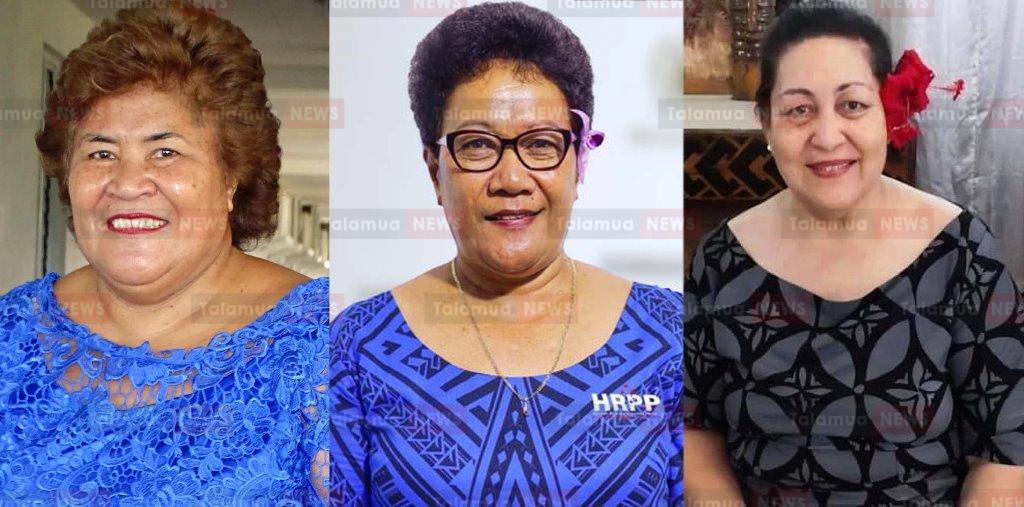Court
Court rules Speaker to swear in 3 additional Women Parliamentarians

By Lagi Keresoma
APIA, SAMOA – 11 MAY 2022: The Supreme Court has ruled for the Speaker of Parliament to swear in three additional women Parliamentarians at the earliest opportunity.
The Court decision was delivered today in favour of three women; Aliimalemanu Alofa Tuuau, Faagasealii Sapoa Feagiai of the Human Rights Protection Party and To’omata Norah Leota of the Faatuatua I le Atua Samoa ua Tasi – FAST party.
The Court declared:
• The Speaker has a duty to swear in Aliimalemanu Alofa Tuuau, Faagasealii Sapoa Feagiai as additional Members of the Legislative Assembly Pursuant to Articles 44(1A)(a), 44 (1A)(b) and 44(1B)(b) of the Constitution.
• The Speaker has the duty to swear-in Toomata Norah Leota as an additional Member of the Legislative Assembly under Article 44(1A)(b) and 44 (1E) of the Constitution.
• Although To’omata Norah Leota is to be sworn in as an additional Member, the Motion she filed with Lolomatauama in M.379/21 is dismissed.
• In accordance with earlier authority of the Court, declare that the swearing-in is constitutionally required to be carried out at the earliest opportunity, there being no constitutional or other legal basis by which the swearing in should be further delayed or deferred.
• Considering the novelty and importance of the issues raised in this litigation, there will be no order as to costs; unless sought by any party as a result of the Motion for Joinder filed by the Hon Speaker of Parliament.
Background
Several articles of the Constitution of the Independent State of Samoa came under the microscope in this case where Aliimalemanu and Faagaseali were applicants in a matter against the Speaker and the Electoral Act 2019.
Central to the argument were Articles 4, 44, 45, 46, 47, 52, and 61 of the Constitution.
Toomata, Lolomatauama Eseta and FAST party also filed a separate case on the same articles of the Constitution against the Electoral Commissioner, HRPP, Aliimalemanu, Faagasealii and the Attorney General.
After the General Election 09 April 2021, FAST and HRPP tied in the results and before the Independent member who held the balance for a Government could decide which party to join, the then Electoral Commissioner Faimalomatumua Mathew Lemisio activated Article 44(1A) regarding the 10% for women in Parliament.
The Head of State on the recommendations of the Commissioner issued a Warrant declaring Aliimalemanu as an MP. By then, the Independent member had joined FAST. But the appointment of Aliimalemanu created a deadlock of 26 all.
FAST took legal action and the Court ruled that the activation of Article 44 can only be done after any by-election and FAST was later declared the Government of the day.
However, the problem that remained was the number of women representatives in Parliament which was only four when it should be 6 according to the Court’s calculation of the 10% of 51 seats.
Still Article 44 could not be activated as there were by-elections pending.
When all was done, the women with the highest percentage based on the formula used were Aliimalemanu and Faagasealii, and HRPP fought to have them sworn in, but the Speaker refused despite the warrant by the HOS and Electoral Commissioner.
On the other hand, Toomata and Lolomatauama claimed that if the calculation was straightforward, could have been declared winners.
Legal challenge
The Court pointed out that because it was alleged the Electoral Commissioner and Head of State’s declarations were nullities in law and because the Electoral Commissioner used the wrong formula to identify the women with the highest number of votes who were eligible for appointment as additional members. It necessitates an examination of Articles 44(1A)(1E) and 44(5) of the Constitution to determine how they operate as this will inform the issue of which women must be appointed to ensure compliance with the terms of the Constitutional guarantee.
The four women applicants in these matters sought declarations to confirm their respective claims for appointment as additional Members of the Legislative Assembly.
The claims as the Court pointed out are:
- Aliimalemanu who was a candidate at the 9 April 2021 General Election for the Constituency of Alataua i Sisifo and Faagasealii who was a candidate at the November 2021 by-election for the constituency of Aleipata Itupa i Lalo, claim to have been validly appointed by the Electoral Commissioner and their appointments are the subject of a valid warrant signed by the Head of State, dated 30 November 2021.
- The other two women applicants Toomata and Lolomatauama challenge the mathematical formula the Electoral Commissioner used to determine the successful appointees. They submit different formulae should have been used, and had they been used, these two women would have been the successful appointees.
The Speaker’s stance
The statement by the Speaker regarding the delay in the swearing-in of Aliimalemanu and Faagasealii.
The Court noted in Article 61 of the Constitution and Standing Order 14(1) impose a mandatory duty on the Hon Speaker to administer to each Member the Oath of Allegiance, before the Legislative Assembly.
“We are bound to observe that in circumstances where the Hon Speaker has not sought a declaratory order from the Supreme Court about the eligibility of the member who wishes to present for swearing in, it is inappropriate for the Hon Speaker to of his own volition simply refuse to undertake his constitutional duty to swear in the Member.”
The Court further stated “The Court does not condone parties, no matter how high a standing, appearing to take the law into their own hands. This is just a recipe for disaster. No one is above the law.”
The court decision today means Parliament will have 7 women Parliamentarians.
Parliament will reconvene Tuesday 17 May 2022.





















